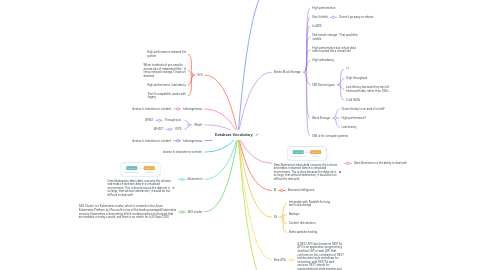Database Vocabulary
作者:Tom Hill


1. EFS
1.1. High performance network file system
1.2. When hundreds of pcs need to access lots of networked files - A fancy network storage. Grows on demand.
1.3. High performance, low latency
1.4. Post 6 compatible, works with legacy
2. heterogeneous
2.1. diverse in character or content.
3. What?
3.1. Through-put.
3.1.1. WHAT
3.2. IOPS
3.2.1. WHAT?
4. heterogeneous
4.1. diverse in character or content.
5. diverse in character or content.
6. Abstraction
6.1. Data Abstraction takes data, removes the schema and makes it abstract data in a virtualised environment. This is done because the data set is so large, that without abstraction, it would be too difficult to deal with.
7. AKS cluster
7.1. AKS Cluster is a Kubernetes cluster, which is created on the Azure Kubernetes Platform by Microsoft is one of the leading managed Kubernetes services. Kubernetes is dominating all the containerization techniques that are available in today's world, and there is no match for it.23 Sept 2020
8. SQL
8.1. SQL is used to communicate with a database. It is the standard language for relational database management systems. SQL statements are used to perform tasks such as update data on a database, or retrieve data from a database
9. Elastic Block Storage
9.1. High performance
9.2. Non Volatile
9.2.1. Doesn't go away on reboot
9.3. In AWS
9.4. Not instant storage - That would be volatile
9.5. High performance but virtual disks and mounted like a virtual hdd
9.6. High redundancy.
9.7. EBS Device types
9.7.1. ??
9.7.2. High throughput
9.7.3. Low latency because they are old fashioned hdds, rather than SSDs
9.7.4. Cold HDDs
9.8. Block Storage
9.8.1. Given the key to an area of a hdd?
9.8.2. High performance?
9.8.3. Low latency
